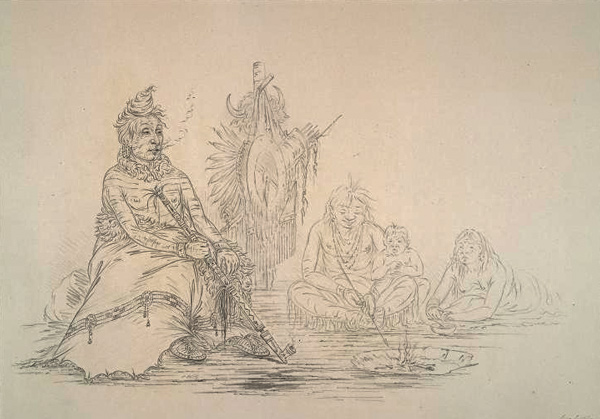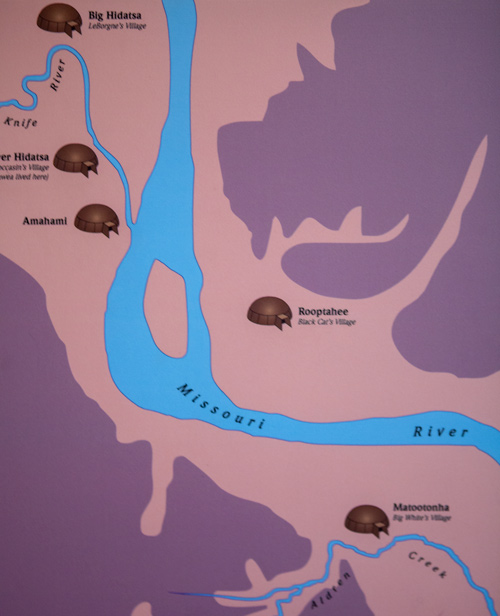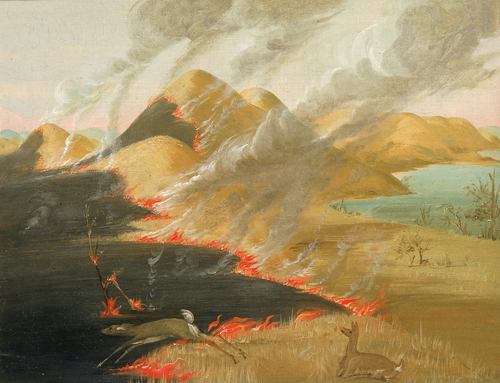Ruptáre, second Mandan village, ND The standard diplomatic speech is given at a council with the Mandans and Hidatsas. The captains ask them to also smoke the pipe of peace with Arikara Chief Too Né. Medals, flags, and clothing are given as gifts.
Eehk-tohk-pah-she-pee-shaw (the Black Moccasin)
George Catlin (1796–1872)
Rare Book Division, The New York Public Library. “Minatarree. 79. Eehk-tohk-pah-she-pee-shaw (the Black Mocasin), Head Chief of the tribe, said to be 105 years old when his portrait was painted . . . .”[1]New York Public Library Digital Collections. Accessed November 2, 2019. http://digitalcollections.nypl.org/items/510d47da-da55-a3d9-e040-e00a18064a99.
The artist recalled Black Moccasin’s connection to the Lewis and Clark Expedition:
This man has many distinct recollections of Lewis and Clark, who were the first explorers of this country, and who crossed the Rocky Mountains thirty years ago.” Black Moccasin’s long-stemmed calumet pipe was “mutually smoked by the chiefs, after the terms of the treaty are agreed upon.[2]George Catlin, Letters and Notes on the Manners, Customs, and Condition of the North American Indians (London, 1841), vol. 1, nos. 23, 29.
Fire on the Prairie[3]Originally aired weekdays by Yellowstone Public Radio during the Bicentennial observance of 2003-2006. Narrated by Hal Hansen. Scripts by Whit Hansen and Ed Jacobson. Produced by Leni Holliman. © … Continue reading
The Usual Speech
Commened a Council ounder a Orning and our Sales Stretched around to Keep out as much wind as possible, we delivered a long Speech the Substance of which Similer to what we had Delivered to the nations below.
—William Clark
Indian Peace Medals
To the 1st Chiefs we gave a medal with the Imp. of the President of the U S. To the 2d Chiefs a medal of weaveing Domestic animals. To the 3rd Chiefs a medal with the impression of a man Sowing wheat.
—William Clark
The Knife River villages moving top to bottom are:
Menetarra: Le Borgne’s village
Metaharta: Sacagawea and Black Moccasin’s village
Mahawha: White Buffalo Robe Unfolded’s village
Ruptáre: Posecopsahe (Black Cat)‘s village
Mitutanka: Sheheke‘s village
Three-way Peace Proposal
the captains requested them to assemble again tomorrow if possable to Give us answer to what we had Sd. to them respecting makeing peace with the Rickarees and all other nations & whether they mean to Go to See their Great father &.C. Capt. Lewis Shot the air Gun which pleased them much
—William Clark
Too Né’s Certificate
we at the end of the Speech mentioned the Ricare who Accompanied us to make a firm peace, they all Smoked with him (I gave this Cheaf a Dollar of the American Coin as a Meadel with which he was much pleased) In Councel we prosented him with a Certificate of his Sincrrity and good Conduct &c.
—William Clark
Corn Mill
The Council being over, he gave presents among them of Goods & Cloathing and to each Nation he gave an American Flag, he also gave to the Mandan Chiefs a Steel Corn Mill, and by Interpreter [René Jusseaume] explained the use of it, in grinding of Corn, instead of pounding it, which was the only way they had of making Corn Meal.—
—Joseph Whitehouse
Deadly Prairie Fire
The Prarie was Set on fire (or Cought by accident) by a young man of the Mandins, the fire went with Such velocity that it burnt to death a man and woman, who Could not Get to any place of Safty, one man a woman & Child much burnt and Several narrowly escaped the flame—
This fire passed our Camp last about 8 oClock P. M. it went with great rapitidity and looked Tremendious
—William Clark
Iowa Vocabulary
In St. Louis, the Commandant of Upper Louisiana forwards an Indian Vocabulary collected by Lewis Crawford at the request of Meriwether Lewis.
St. Louis 29th. Octr. 1804.—
Sir,
Captain Lewis, before he left this, engaged a trader on the River Demoine to procure vocabularies of the Ayovais and Sioux languages. The trader has obtained that of the former, which I do myself the honor to enclose:
Amos Stoddard, Capt
corps of artillerists.
Weather Diary
Thermot. at rise
Weather Wind at rise
thermotr. at 4 P.M. Weather Wind at 4 oC P.M. 32 fair S W 59 fair S. W. we Spoke to the Indians in council— tho’ the wind was so hard that it was extreemly disagreeable. the sand was blown on us in clouds—
—Meriwether Lewis[4]To assist the reader, the editor of this web page has omitted the “day of the month” column and spelled out some abbreviations.
Knife River Indian Villages National Historic Site is a High Potential Historic Site along the Lewis and Clark National Historic Trail managed by the U.S. National Park Service. A unit of the National Park System, the site is located at 564 County Road 37, one-half mile north of Stanton, North Dakota. It has exhibits, trails, and a visitor center.
Notes
| ↑1 | New York Public Library Digital Collections. Accessed November 2, 2019. http://digitalcollections.nypl.org/items/510d47da-da55-a3d9-e040-e00a18064a99. |
|---|---|
| ↑2 | George Catlin, Letters and Notes on the Manners, Customs, and Condition of the North American Indians (London, 1841), vol. 1, nos. 23, 29. |
| ↑3 | Originally aired weekdays by Yellowstone Public Radio during the Bicentennial observance of 2003-2006. Narrated by Hal Hansen. Scripts by Whit Hansen and Ed Jacobson. Produced by Leni Holliman. © 2003 by Yellowstone Public Radio. |
| ↑4 | To assist the reader, the editor of this web page has omitted the “day of the month” column and spelled out some abbreviations. |





